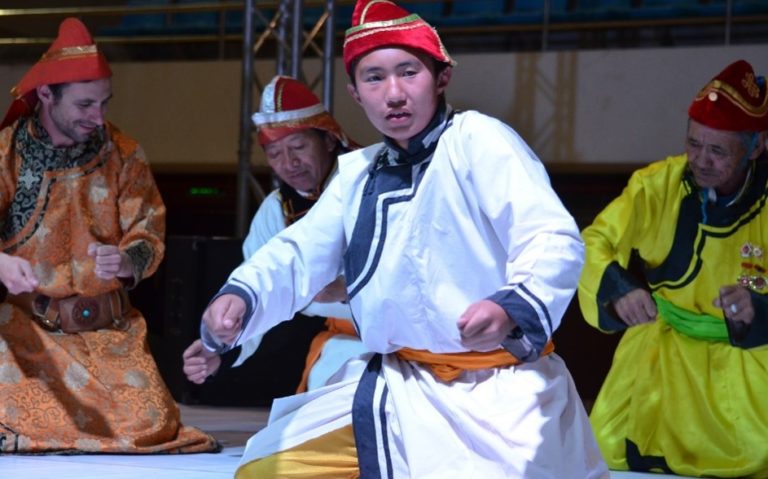Tuesday 5 May 2026, 4.00-6.00pm (BST)
This is an online event. Register for the Zoom here:
https://us02web.zoom.us/webinar/register/WN_VrjHFAS2SmaANh7ISeCrhA#/registration
Lives of Talent:
an ethnography of dancers’ work/life in Mongolia
Speaker:
Raphaël Blanchier, anthropologist, Université Clermont Auvergne and IFRAE-CNRS, LESC-CREM
Invited Discussant:
Cassis Kilian, anthropologist and performer, Goethe-Universität Frankfurt
Abstract:
In Mongolia, recognised dancers, professional or otherwise, are viewed as special individuals endowed with an innate quality called av’’yaas (“talent”). A dancer’s av’’yaas allegedly includes a variety of aptitudes, which include physical capacities (i.e. being flexible, have suitable bodily proportions), perceptual skills (i.e. feeling the music) and motor skills (i.e. moving with fluidity, expression and musicality). However necessary, av’’yaas is not sufficient on its own for making a dancer. Being born with av’’yaas engages a person to prove themself worthy of their gift to become a successful dancer. By contrast, a “talented” (av’’yaastai) person may be accused of “wasting” their talent. From childhood to old age, a dancer’s life therefore presents a series of challenges that publicly tests their av’’yaas, ability and life choices to live up to their expectation. This, I argue, follows what E. Goffman called ‘line of conduct’: an accumulation of situations confirming (or denying) the public acknowledgement of their distinctive nature.
Grounded in an immersive style of ethnographic fieldwork among Mongolian dancers, as well as in comprehensive interviews and self-learning, this presentation discusses a position endorsed by French sociologists according to which “talent”, or its correlate “vocation” should be seen as a deceitful notion crafted to exploit artists in a capitalistic world. I argue that “artistic work” should be considered as something more than mere “work” in itself and, consequently, that the notion of “artistry” merits closer anthropological examination.
Biographical note:
Raphaël Blanchier is an associate professor in the anthropology of dance (Université Clermont Auvergne, ACTé Research Center), and associate researcher at IFRAE-CNRS Research Center, and at LESC-CREM. Trained in social anthropology, dance studies and humanities, he conducts research on Mongolian dances, cultural transmission and national identity in the age of globalisation. He has been granted the GIS Asie (Asian Studies Network) Award for his PhD. He has directed the Erasmus Mundus Master’s Programme Choreomundus: International Master in Dance Knowledge, Practice and Heritage, and he has been the editor-in-chief of the academic journal Lectures anthropologiques. His books and papers interrogate transmission and apprenticeship among dancers, the making of a sense of community through dance (Mongolian dance, bourrée auvergnate), Cultural Heritage making policies in Mongolia today and during the socialist era, the use of digital media in the circulation of dance forms, and, more recently, the “work of hope” in post-socialist urban contexts in Mongolia.
Cassis Kilian is a postdoctoral fellow in the research project “NoJoke” which studies humour as an epistemic practice of the political present [www.nojoke.net]. She was an actress before writing her PhD on African film and teaching at the Department of Anthropology and African Studies at Mainz University. Her publications focus on cosmopolitanism, senses, perception and methodology. Her most recent book is entitled “Attention in Performance: Acting Lessons in Sensory Anthropology” (Routledge, 2021).
_____________________________________________
Artistry@Work is an online Seminar Series in the Anthropology of Artists & Artisans, running 2024–2026
Maison des Sciences de l’Homme–Université Clermont Auvergne, in collaboration with the Royal Anthropological Institute
Organisers: Dr Raphaël Blanchier & Professor Trevor Marchand
This seminar series in anthropology explores the situated practices of ‘artistry at work’ and, more broadly, the working lives and career trajectories of artists and artisans plying their trades in regions around the globe. The scope of the series also encompasses studies of occupations not conventionally categorised as “artistic” but that nevertheless foster creativity among (some) practitioners and even accommodate the development of “artist” identities.
Find all events in the series here: https://therai.org.uk/series/artistrywork/


